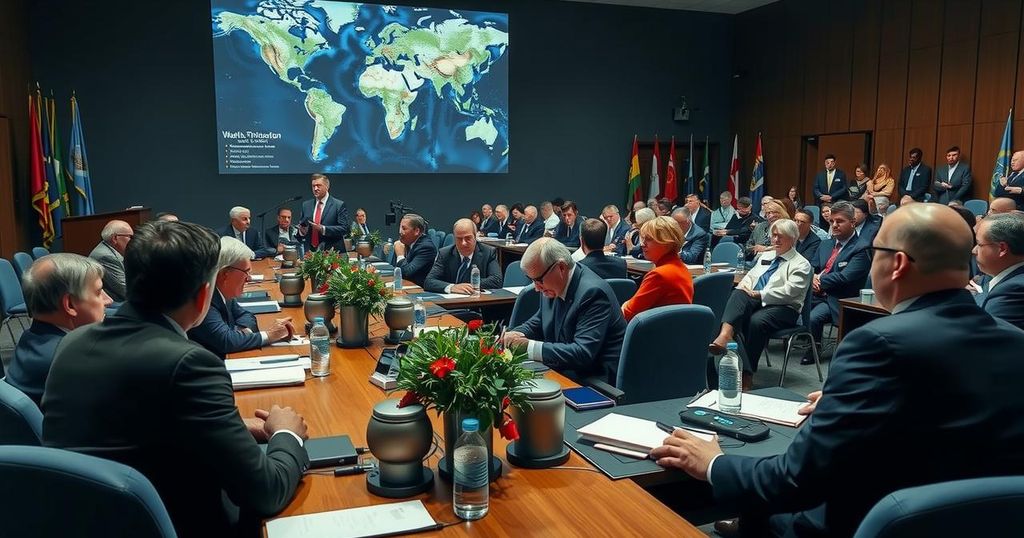Wars Complicate Climate Negotiations at COP29 in Baku

At COP29 in Baku, discussions on climate change are overshadowed by ongoing conflicts in Gaza and Ukraine, complicating negotiations for financial aid to develop countries like Sudan. Activists urgently stress the need for global unity to tackle climate issues, linking warfare directly to increased vulnerability and resource allocation challenges for climate action. Leaders also raise concerns regarding the growing threat of climate change amidst geopolitical tensions, emphasizing that solidarity is crucial for effective climate responses.
The ongoing wars across various regions, notably in Gaza and Ukraine, are increasingly complicating global climate negotiations at COP29 in Baku, Azerbaijan. Activists, including those who have personally suffered due to these conflicts, emphasize the urgent need for a unified global response to climate change. The central objective of the talks is to secure financial support from wealthier nations for developing countries affected by climate impacts and conflict alike. However, as leaders express, the ongoing violence and displacement divert attention and resources away from necessary climate action, stressing the interconnectedness between warfare and ecological stability. Nisreen Elsaim’s personal experience as a climate activist from Sudan has underscored the perilous link between conflict and climate vulnerability. Her narrative is echoed by many who have faced similar adversities amid wars that displace millions and disrupt crucial infrastructures for climate adaptation, making a call for the COP29 negotiations to succeed a matter of urgency and survival for nations like hers. Today’s discussions also highlight how wars waste resources that could fund climate action, with experts asserting that military tensions distract from essential climate dialogues. Political leaders at COP29 are painting a stark picture of the threats posed by climate change, linking it to exacerbated poverty and insecurity. The United Nations and various global leaders have recognized the cascading crises stemming from conflicts, which impede nations’ capacities to tackle climate issues effectively. The distress caused by war in regions such as the Middle East not only destroys physical infrastructures but also undermines environmental advancements. Scholars estimate that Russia’s invasion of Ukraine has resulted in significant greenhouse gas emissions, further complicating efforts to combat climate change. Advocates at the conference argue for a systemic shift of resources from military expenditures to climate actions, framing the current conflicts as impediments to international cooperation necessary for progress on climate targets. With pressing challenges posed by environmental degradation and conflict, there is an urgent appeal for global solidarity and support directed towards those most affected by climate-induced crises. As COP29 produces intensive discourse around these issues, policymakers are urged to prioritize integrating conflict resolution strategies within climate action frameworks to secure a sustainable future for vulnerable nations.
The intersection of warfare and climate change is increasingly recognized as a critical challenge facing nations during global climate discussions, particularly at COP29. Armed conflicts not only displace populations but also disrupt environmental stability, making countries more vulnerable to climate impacts. As various leaders converge in Baku, the urgency to align international efforts to mitigate climate change while addressing the complexities introduced by global conflicts has never been more pronounced. Activists and politicians alike stress that climate negotiations must not ignore the detrimental effects of warfare on both the environment and humanitarian efforts.
The ongoing wars significantly hinder the effectiveness of climate negotiations, as they divert vital resources and attention that could otherwise be directed toward climate mitigation and adaptation strategies. The need for a united front against both environmental and geopolitical crises is more evident than ever, as highlighted by advocates and leaders at COP29. Achieving progress in climate action is contingent upon recognizing and addressing the challenges posed by armed conflicts, reinforcing the call for a shift in both policy and resource allocation towards sustainable solutions.
Original Source: apnews.com








